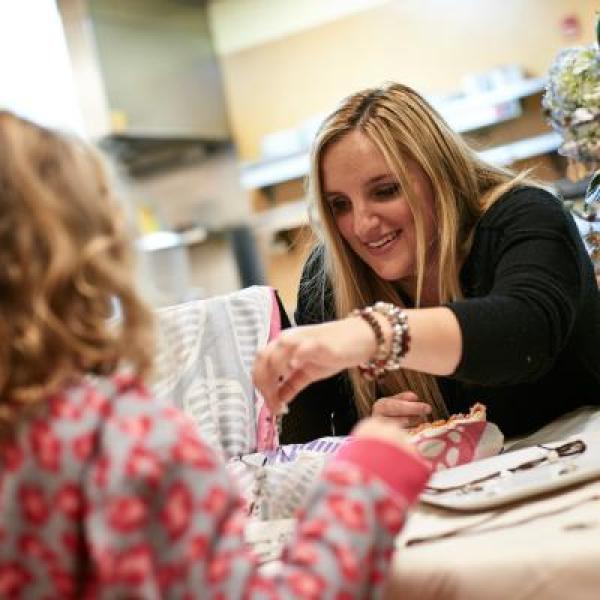Collegiate Entrepreneurship
A Strong History of Campus Support
Long before entrepreneurship education became a mainstay on college campuses across the country, Morgan Foundation’s founder, Burt Morgan, expressed his strong belief in the importance of entrepreneurship education and dedicated much of the Foundation’s resources to advance this cause. The Foundation funded one of the first business plan competitions in the nation at Purdue University and dedicated millions of dollars to erecting entrepreneurship centers on campuses in Northeast Ohio and beyond.
In 2006, Burton D. Morgan Foundation partnered with the Ewing Marion Kauffman Foundation to launch the Northeast Ohio Collegiate Entrepreneurship Program (NEOCEP), a $6.6 million initiative to encourage entrepreneurship in higher education which sparked the transformation of our region’s higher education entrepreneurial ecosystem.
Today, the Foundation partners with approximately 22 colleges and universities throughout Northeast Ohio to provide curricular and co-curricular entrepreneurship programming designed to teach students to think, innovate, and create new products and services.
NEOLaunchNET
NEOLaunchNET is a regional initiative that inspires a culture of innovation on college and university campuses, building upon the unique assets and strengths of each school and sparking the entrepreneurial mindset in enterprising students. Students have the opportunity to start ventures grounded in their passions and receive targeted co-curricular coaching and mentoring.
Originally launched in 2012 as Blackstone LaunchPad, the LaunchNET network currently includes programs at Baldwin Wallace University, Case Western Reserve University, John Carroll University, Kent State University, and Lorain County Community College. Through the network, colleagues closely collaborate in a cross-campus peer-to-peer learning environment that bolsters the impact on all five campuses.
Collegiate Thought Leadership
In 2017, the Foundation published a ten-year retrospective of the NEOCEP program to examine evolution and impact of the initiative and to capture what we've learned. This was the first publication in the Intersections series, a periodic report designed to provide useful and easily digestible reflections and learnings for our stakeholders and collaborators.
Read Collegiate Intersections Publication
Periodically, the Foundation conducts comprehensive analyses of the current landscape in each of our grantmaking areas. By surveying the ecosystem and listening to our partners, we gain a firsthand understanding of the needs and priorities in each space. The Foundation completed the first phase of our collegiate entrepreneurship landscape assessment in late 2020 and reported on phase two progress in June 2021.
Read Landscape Assessment: Phase 1 Summary
READ LANDSCAPE ASSESSMENT: PHASE 2 SUMMARY
Foundation Values - Collegiate Entrepreneurship Programming
Excellence in collegiate entrepreneurship takes many shapes and forms—there is no single formula or roadmap to igniting entrepreneurial energy. Burton D. Morgan Foundation supports organizations whose senior leadership embraces entrepreneurship. We believe the most vibrant collegiate entrepreneurship programs seek to…
- Grow from the essence of institutional culture
Sustainable integration of entrepreneurship into collegiate programs is best accomplished by building upon existing cultural strengths and values. - Draw influence from the organization's senior leadership
Vocal champions in the highest offices of the organization help build programs that gain traction, develop long-term sustainability, and best serve student needs. - Exhibit interdisciplinary reach
Forward-thinking leaders break down barriers and encourage interaction among students and faculty from seemingly unrelated areas of study, breeding innovation and sparking connections. - Build the entrepreneurial mindset
Impactful programs allow students to marshal their talents and take informed risks while exploring ventures that foster the critical entrepreneurial skills of ideating, problem solving, pivoting, and pitching. - Engage underserved populations
Robust inclusion of diverse ideas, voices, and perspectives enriches students’ entrepreneurial experiences and inspires innovation. - Embed mentorship and coaching
Balanced programs enlist qualified mentors and coaches who help steer venture progress while maintaining a primary focus on the student's academic experiences and personal growth - Collaborate with ecosystem partners
Dynamic campuses reach beyond their institutions, facilitating opportunities for students to connect with entrepreneurial ecosystem resources and promoting pathways for students to pursue ideas that require increasingly sophisticated support. - Evaluate their effectiveness
Continuous learning requires more than just basic data – progressive programs employ third party evaluators and scrutinize evaluation results to inform practices and modify components. - Pivot to meet changing needs
Responsive programs adapt to shifting entrepreneurial landscapes to take full advantage of new opportunities. - Share lessons learned
Dedicated ecosystem partners prioritize the regular exchange of lessons learned across campus and through peer-to-peer entrepreneurship learning communities. - Demonstrate fiscal responsibility
The Foundation’s collegiate entrepreneurship values are also visually depicted in a poster.

